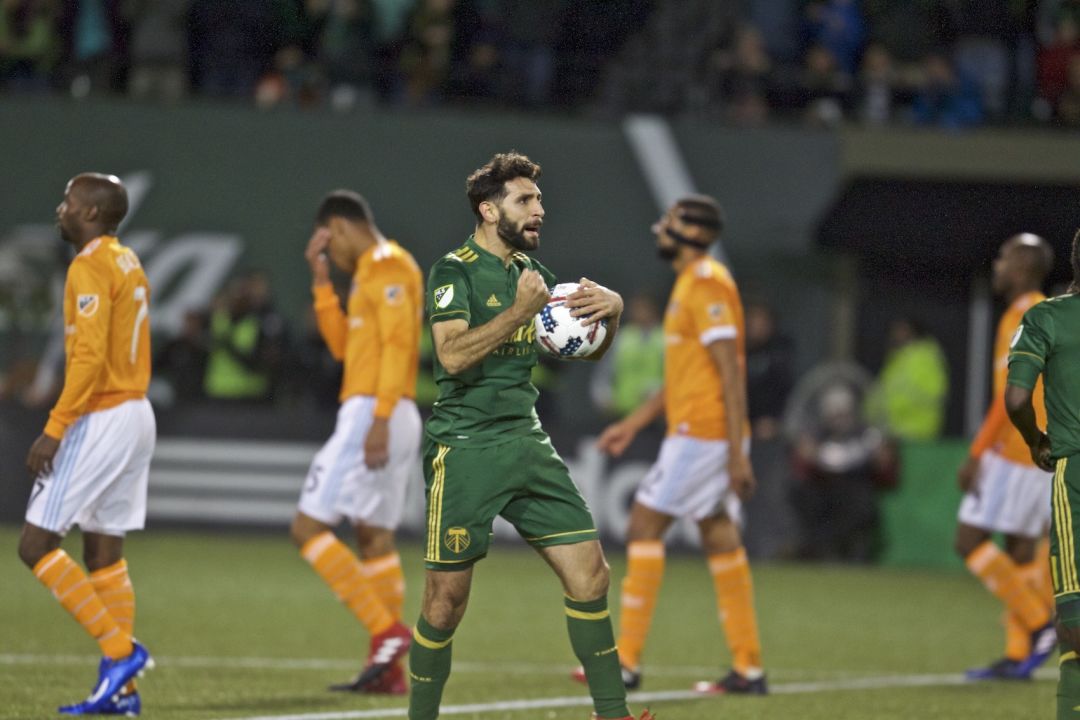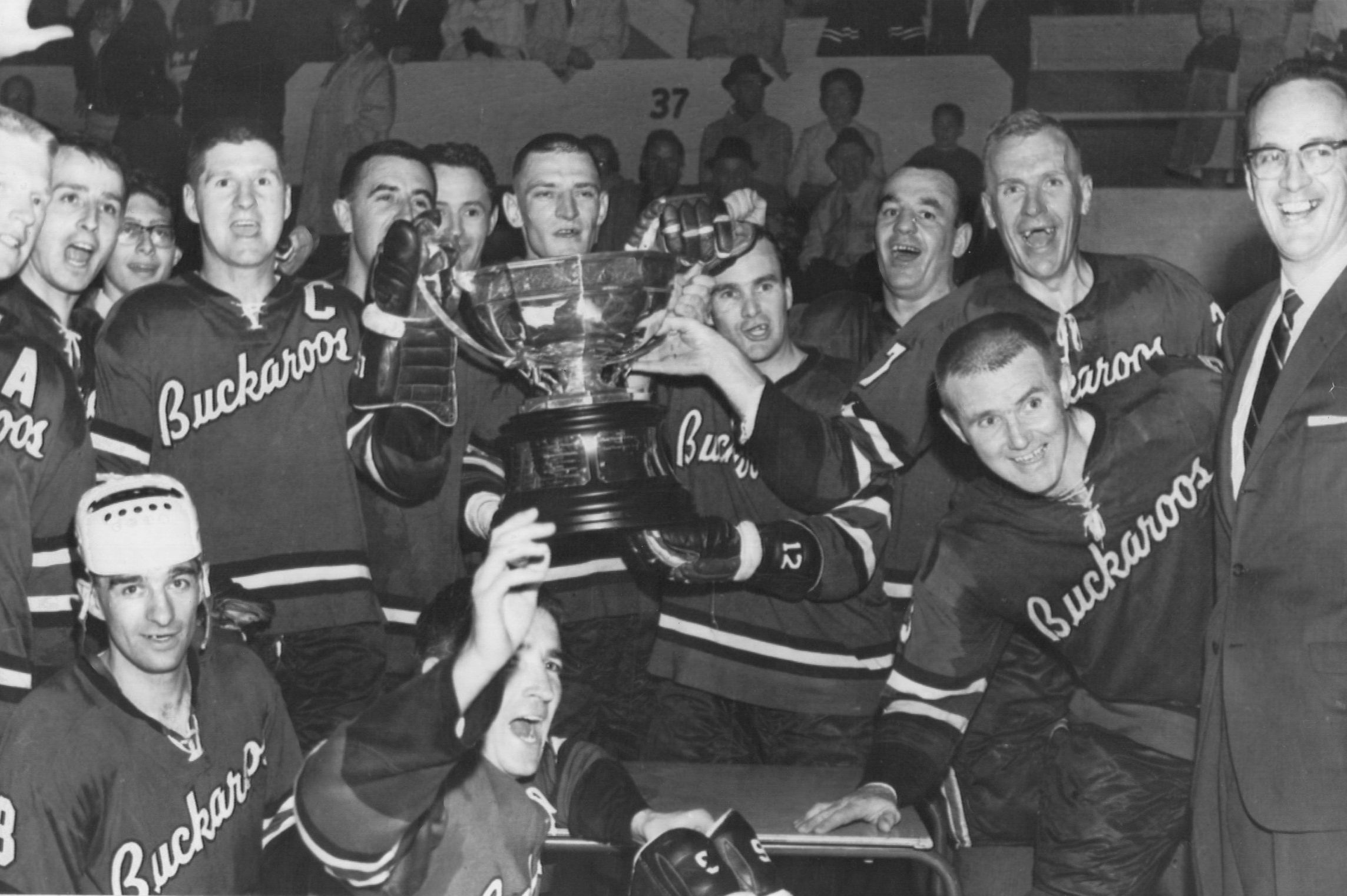The Timbers Are in the Playoffs, Baby!

Record-setting goalscorer Diego Valeri during a come-from-behind home win against the Houston Dynamo in March
Editor’s note: Chris covers the Timbers all season long for the excellent Stumptown Footy blog and Soccer Made in Portland podcast.
How often do Portland sports teams chase championships? Not very. But over the next few weeks, the Portland Timbers will take a crack at winning the Major League Soccer Cup, making their third foray into the league’s unforgiving playoffs in the five years coach Caleb Porter has managed the club. After what felt like a grinding, stop-start regular season, the Timbers surged to the top of the MLS Western Conference to capture a top seed in the 12-team bracket—already winnowed by a few mid-week elimination games, which produced the Houston Dynamo as Portland’s semifinal opponent.
How did we get here? Well, it wasn’t easy.
In 2013, the Timbers took the league by storm and rode a 15-game unbeaten late-spring and summer run to finish atop the West standings. Two years later, in 2015, Porter’s club caught fire in October and improbably rocketed to an MLS Cup crown.
In between, however, the Timbers (and the team's fans) suffered. Both 2014 and 2016 were deeply disappointing for the Timbers, as both teams failed to live up to their lofty expectations and missed the postseason. The lesson many fans drew: even-numbered years were cursed, but odd numbered years promised greatness.
Still, the 2017 season felt like a dreaded even-numbered year for much of the summer. After a blistering start in March, the Timbers won just four of 18 games from late-March through mid-July, slipping from the top of the early-season table to teetering perilously above the red line that separates the league’s playoff qualifiers from its premature vacationers.
Injuries and absences took their toll. Captain and starting centerback Liam Ridgewell played only 15 of the season’s 34 games; Darlington Nagbe and David Guzman missed time playing with their respective national teams, and the team suffered through a parade of minor injuries and absences that forced Porter to rotate his starting lineup on a weekly basis.
But then, a spark of hope.
Coming off an embarrassing 4-1 home loss to Real Salt Lake, the Timbers went to Vancouver in late-July depleted by injuries and suspensions and staring rock bottom in the face. But with 20-year-old rookie striker Jeremy Ebobisse making his first MLS start and a starting lineup that featured only five of 11 starters, the Timbers finally flipped their cosmic calendar and upset the Whitecaps.
From that point on, the Timbers looked like the odd-year team we’ve come to know under Porter. Bolstered by the midseason addition of centerback Larrys Mabiala, a Timbers defense got stingier, going from 1.67 goals allowed to only 1.15 goals allowed per game. Talisman (and league MVP hopeful) Diego Valeri carried the attack with a record-setting and superlative-defying streak in which he scored in nine straight games—becoming the only MLS player ever to do so.
The injury bug, however, wasn’t finished. Just as the Timbers started to build momentum for their stretch run, starting striker and erstwhile club-record holding goalscorer Fanendo Adi suffered a seemingly minor injury that has dragged on for more than two months and into the playoffs.
This time, though, losing a key contributor couldn’t stop the Timbers’ momentum. Behind their newfound defensive fortitude, Valeri’s excellence, and contributions from across the roster, the Timbers finished the season with eight wins and two draws in their last 13 games to boomerang back to the top of the table
So, what now?
The 2017 Western Conference repeatedly pulled any breakaway back to the peloton. In fact, the four remaining teams in the Western conference finished within three points of each other in the regular season. Translation: the margins separating these teams are tight.
In the two-leg conference semifinal that begins Monday evening, the Timbers head to Texas to face the Houston Dynamo, a counterattack-happy team led by a stable of young, dynamic attacking talent in Alberth Elis, Erick “Cubo” Torres, Romell Quioto, and Mauro Manotas.
The Dynamo are a formidable foe when playing at home. In 2017 they won 12 times at BBVA Compass Stadium and only lost once. On the road, however, Houston struggled, taking only 10 from 51 possible points in their 17 away games. As a result, Porter’s challenge on Monday will be to keep the total-goals series in hand. The Timbers don’t need to win big (or at all, even), but a big loss could spell trouble in the second leg on November 5.
Porter, therefore, will set up his team to limit the Dynamo’s ability to break out into the open field. When they do, look to Ridgewell and Mabiala to manage Houston’s pacey attack.
If the Timbers can come home ahead of or at least within striking distance of the Dynamo, Portland’s Providence Park advantage could very well be enough to see the Timbers through to the conference final where they would face one of their Cascadian rivals for the right to advance to MLS Cup. (The Seattle Sounders and Vancouver Whitecaps are locked in their own semifinal showdown.)
Unlike 2013 (when the Timbers shocked the league) or 2015 (when they caught fire at the right moment), the Green and Gold’s push in 2017 has been a slow and, Porter undoubtedly hopes, sustainable improvement in form. Sprinkle in a little odd-year magic, and the Timbers are hoping for another run to MLS Cup.




